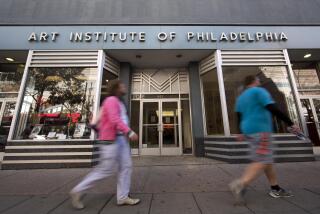A Lesson in Overkill
- Share via
In 1988, the authoritative American Council on Education published a book, “Diploma Mills,” that singled out California as a world center of fraudulent trade schools. Students were paying tuition to enter phantom schools, which would then fold, taking the tuition money with them, before classes started.
That began to change in 1989 when the Legislature created the Council for Private Postsecondary and Vocational Education. That body was established to protect students from fraudulent practices and to require schools issuing diplomas or degrees to meet basic standards.
Now, however, some legislators and lobbyists in Sacramento are trying to dismantle the council, arguing that its second-in-command, Sheila Hawkins, has been too aggressive in ordering trade schools to refund money to students because of allegedly fraudulent practices. Moreover, they say, small trade schools, like Bob Smith’s horseshoeing academy, a one-man operation teaching no more than 50 students a year, are saddled by seemingly endless paperwork and fees that can eat up more than 10% of their income.
But the idea of discarding state oversight of trade schools because of one hard-charging official is ludicrous. The lessons of past frauds should be obvious. In addition, the concerns of small trade school owners are addressed by AB 71, a pending bill that would streamline paperwork while exempting small trade schools from the requirement to put specified percentages of their students in jobs in the trade they were taught.
According to both state and national studies, the council has succeeded in chasing diploma mills out of the state, in substantially reducing student complaints and boosting the level of integrity in California’s trade school industry.
The legislators lobbying to kill the agency, and turn back the clock, are supporting a cynical campaign that can tarnish the state’s reputation for first-rate schools. Where’s the sense of it?
More to Read
Sign up for Essential California
The most important California stories and recommendations in your inbox every morning.
You may occasionally receive promotional content from the Los Angeles Times.










